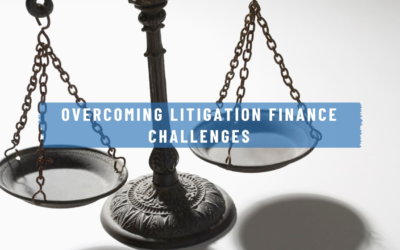Access to justice is a fundamental principle in any fair and just society. Unfortunately, the legal system, while designed to protect rights and provide remedies, can often be financially out of reach for many individuals and businesses. Legal costs, which can include attorney fees, expert testimony, court fees, and other litigation expenses, can easily run into the hundreds of thousands if not millions of dollars—amounts that are simply unaffordable for many plaintiffs.
This financial barrier often leads to a situation where only the wealthiest parties can afford to seek justice, while others are left without a remedy. This disparity creates an inequitable legal system where justice is not truly accessible to all.
Early-stage funding for legal cases is a game-changer. It offers a solution that helps facilitate access to justice by providing the financial resources necessary for plaintiffs to pursue meritorious claims. This blog will explore how early-stage funding enables individuals, businesses, and organizations to access the legal system, fight for their rights, and ensure that justice is not a privilege for the few but a right for all.
What is Early-Stage Funding for Legal Cases?
Early-stage funding refers to the financial support provided to plaintiffs at the beginning of their legal proceedings. This funding is typically used to cover the costs associated with pre-litigation, including:
- Attorney fees
- Expert witness fees
- Counsel Opinions
Early-stage litigation funding is particularly important for plaintiffs who may lack the financial resources to pursue legal claims against well-funded defendants, such as large corporations or institutions.
For organizations like Ignitis, early-stage funding is not just about supporting plaintiffs—it’s about enabling a fairer legal process where individuals and businesses, regardless of their financial situation, can access the courts and seek justice.
Why Early-Stage Funding is Crucial for Access to Justice
The legal system is designed to be a mechanism for resolving disputes and ensuring justice. However, the high costs associated with litigation can create a barrier that keeps many plaintiffs from pursuing legitimate claims. This leads to the unfortunate reality that only those who can afford to finance their legal battles can seek remedies, while others are left without access to justice.
Here’s why early-stage funding is crucial for facilitating access to justice:
1. Financial Barriers to Legal Access
Legal claims, especially in complex litigation cases, can require substantial upfront costs. Whether it’s hiring attorneys, expert witnesses, or covering other fees, the financial burden can be overwhelming. For many individuals and businesses, especially those with limited resources, these costs create an insurmountable barrier to pursuing justice.
Early-stage funding removes this barrier by providing plaintiffs with the capital necessary to proceed with their cases. This allows plaintiffs to pursue meritorious claims that would otherwise be abandoned or settled for far less than they deserve.
2. Leveling the Playing Field in Legal Disputes
In many legal disputes, particularly those involving large corporations, insurance companies, or government entities, the defendant often has significantly more financial resources. These entities can afford to hire top lawyers, employ delay tactics, and prolong litigation to wear down the opposing party.
Without financial support, plaintiffs are at a serious disadvantage. Early-stage funding allows plaintiffs to level the playing field by ensuring they have access to the same resources as their well-funded adversaries. This ensures that the financial strength of a defendant does not unduly influence the outcome of a case, enabling merit-based decisions in the courts.
3. Ensuring Fairness in Legal Outcomes
Access to justice is not just about having the financial means to hire an attorney; it’s about ensuring that every individual, regardless of their wealth, has the opportunity to present their case and seek redress. Early-stage funding ensures fairness by providing equal access to legal representation, allowing plaintiffs to pursue their claims without being financially disadvantaged by the wealth of their opponents.
Moreover, early-stage funding allows plaintiffs to reject unfair settlements. Without the pressure of mounting legal costs, plaintiffs can pursue a fair settlement or decide to litigate if necessary, ensuring that they receive the compensation they deserve.
4. Supporting Public Interest Cases
Many cases that need funding are not just about individual or corporate disputes—they can involve important public interest issues, such as environmental law, consumer protection, or human rights. These types of cases often require significant legal resources to pursue, and the financial constraints can prevent these important claims from reaching the courtroom.
Early-stage funding helps facilitate these types of public interest cases, ensuring that they are not dismissed simply because they lack financial backing. This form of funding supports social justice, enabling individuals and groups to challenge systemic injustices and advocate for the public good in the courts.
How Early-Stage Funding Facilitates Access to Justice
1. Empowering Plaintiffs to Fight Back
Many plaintiffs, especially in complex cases, find themselves at a disadvantage because of the costs of litigation. Early-stage funding allows plaintiffs to empower themselves to fight back against adversaries who are better equipped to handle a prolonged legal battle. With the financial backing provided by funding, plaintiffs no longer have to worry about running out of money mid-case or being forced to settle for less than they deserve.
2. Providing Resources for Legal Experts
In complex legal cases, expert witnesses are often needed to provide crucial testimony. However, expert witnesses can be expensive, and many plaintiffs cannot afford their fees. Early-stage funding helps cover these costs, ensuring that the plaintiff can secure the necessary expert testimony to strengthen their case.
3. Enabling a More Equitable Legal System
By providing funding to plaintiffs who might otherwise be unable to afford litigation, early-stage funding creates a more equitable legal system. It ensures that meritorious cases have the chance to be heard in court, regardless of the financial status of the plaintiff. This is essential in a fair justice system, where legal outcomes should be determined by the strength of the case, not the size of the litigant’s bank account.
Real-World Example: Early-Stage Funding in Action
One powerful example of how early-stage funding facilitates access to justice can be seen in class action lawsuits, which frequently involve thousands of injured plaintiffs but generally lower damages per person. In many instances, large corporations can afford to drag out the litigation process, hoping to wear down plaintiffs into accepting lower settlements. Litigation funding allows plaintiffs to continue their fight without being financially overwhelmed, ensuring that the case progresses and increasing the chances of a favorable outcome.
For example, in a consumer class action, the plaintiffs may be fighting against a company accused of deceptive practices. The plaintiffs may face a defendant with vast legal resources. Without funding, they could be forced to settle or drop the case. However, litigation funding allows the plaintiffs to hire expert witnesses, engage a skilled legal team, and cover all the costs necessary to take the case to trial.
With the backing of early-stage funding to get these cases off the ground, these plaintiffs are empowered to pursue justice and ensure that their voices are heard.
Conclusion
Early-stage funding plays a crucial role in facilitating access to justice by providing the financial resources necessary for plaintiffs to initially pursue complex legal claims. By leveling the playing field, supporting public interest cases, and ensuring that individuals are not excluded from the legal system due to financial constraints, early-stage funding helps create a fairer, more accessible legal system.
At Ignitis, we are proud to be part of this process, ensuring that deserving plaintiffs have the financial support they need to seek justice and hold wrongdoers accountable. Early-stage funding enables individuals and organizations to fight for what is right, regardless of their financial situation.
For plaintiffs seeking funding, the next steps are clear: present a strong case, engage experienced legal counsel, and leverage the resources available to pursue justice. With early-stage funding, the opportunity for access to justice is within reach for all.













0 Comments